
Oliver! is a stage musical, with book, music and lyrics by Lionel Bart. The musical is based upon the 1838 novel Oliver Twist by Charles Dickens.
This is a list of notable events in music that took place in the year 1903.
This is a list of notable events in music that took place in the year 1901.
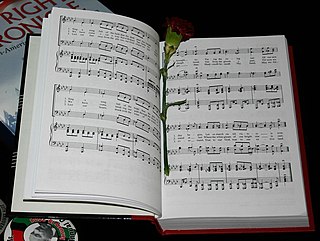
"Lift Every Voice and Sing" is a hymn with lyrics by James Weldon Johnson (1871–1938) and set to music by his brother, J. Rosamond Johnson (1873–1954). Written from the context of African Americans in the late 19th century, the hymn is a prayer of thanksgiving to God as well as a prayer for faithfulness and freedom, with imagery that evokes the biblical Exodus from slavery to the freedom of the "promised land."

Robert Allen Cole Jr. was an American composer, actor, and playwright who produced and directed stage shows. In collaboration with Billy Johnson, he wrote and produced A Trip to Coontown (1898), the first musical entirely created and owned by black showmen. The popular song La Hoola Boola (1898) was a result of their collaboration. Cole later partnered with brothers J. Rosamond Johnson, a pianist and singer, and James Weldon Johnson, a pianist, guitarist and lawyer, creating more than 200 songs.

John Rosamond Johnson was an American composer and singer during the Harlem Renaissance. Born in Jacksonville, Florida, he had much of his career in New York City. Johnson is noted as the composer of the tune for the hymn "Lift Every Voice and Sing". It was first performed live by 500 Black American students from the segregated Florida Baptist Academy, Jacksonville, Florida, in 1900. The song was published by Joseph W. Stern & Co., Manhattan, New York.
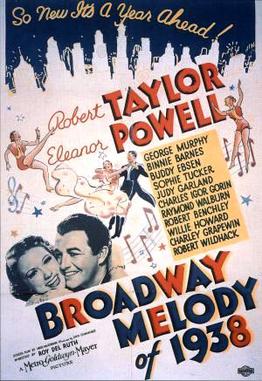
Broadway Melody of 1938 is a 1937 American musical film produced by Metro-Goldwyn-Mayer and directed by Roy Del Ruth. The film is essentially a backstage musical revue, featuring high-budget sets and cinematography in the MGM musical tradition. The film stars Eleanor Powell and Robert Taylor and features Buddy Ebsen, George Murphy, Judy Garland, Sophie Tucker, Raymond Walburn, Robert Benchley and Binnie Barnes.

African-American musical theater includes late 19th- and early 20th-century musical theater productions by African Americans in New York City and Chicago. Actors from troupes such as the Lafayette Players also crossed over into film. The Pekin Theatre in Chicago was a popular and influential venue.

Born to Dance is a 1936 American musical film directed by Roy Del Ruth and starring Eleanor Powell, James Stewart and Virginia Bruce. It was produced and distributed by Metro-Goldwyn-Mayer. The score was composed by Cole Porter.

Little Mary Sunshine is a musical that parodies old-fashioned operettas and musicals. The book, music, and lyrics are by Rick Besoyan. The original Off-Broadway production premiered November 18, 1959 at the Orpheum Theatre in New York City's East Village. Staying in the neighborhood, it moved to the Player's Theatre on June 21, 1961, then, finally, to the Cherry Lane Theatre on March 21, 1962. Closing was Sept. 2, 1962. Combined run was 1,143 performances. It was seen briefly in a West End production in 1962 and has become a popular show for amateur and semi-professional groups in the United States and elsewhere.
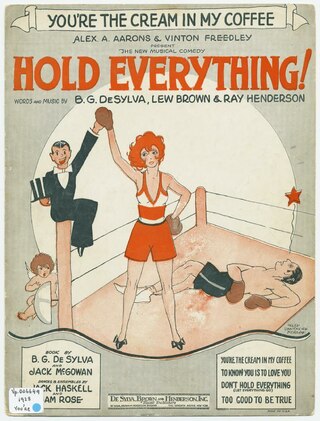
"You're the Cream in My Coffee" is a popular song published in 1928. Hit recordings were by Annette Hanshaw, Ben Selvin, Ted Weems and Ruth Etting.

Gentleman Joe, The Hansom Cabbie is a farcical musical comedy with music by Walter Slaughter and a libretto by Basil Hood.

"Love Is Here to Stay" is a popular song and jazz standard composed by George Gershwin with lyrics by Ira Gershwin for the movie The Goldwyn Follies (1938).
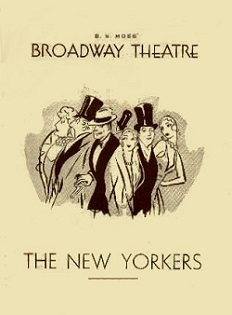
The New Yorkers is a musical written by Cole Porter and Herbert Fields (book). Star Jimmy Durante also wrote the words and music for the songs in which his character was featured.

"Boys the Old Flag Never Touched The Ground" is a patriotic song that was sung at events about the Medal of Honor recipient Sgt. William H. Carney of the 54th Massachusetts Volunteer Infantry. The song was written by Bob Cole, James Weldon Johnson, and J. Rosamond Johnson and was sung in their Broadway musical "Shoo Fly Regiment." It was published in 1901. They dedicated the song to Carney.
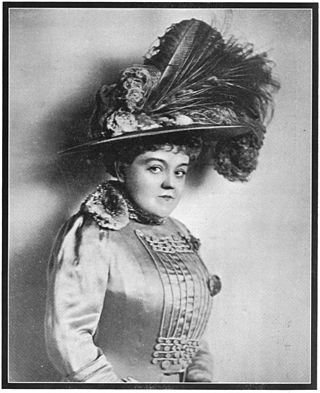
Marie Cahill was a Broadway stage actress and vocalist. Her parents were Irish immigrants Richard and Mary Cahill. She appeared in comic operas including Judy Forgot. She was also in films.
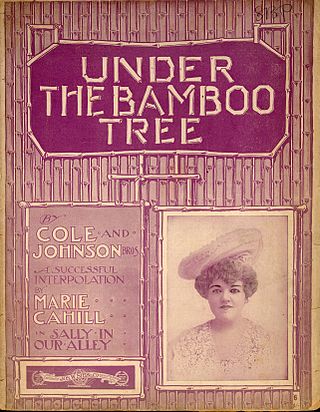
"Under the Bamboo Tree" is an American song composed by Robert Cole, J. Rosamond Johnson, and James Weldon Johnson. J. W. Stern & Co. published it in 1902. A ragtime hit, it sold over 400,000 copies.
Sally in Our Alley was a 1902 Broadway musical comedy show. It helped Marie Cahill reach stardom and popularized songs. The title refers to the popular saying that developed from the British song "Sally in Our Alley". The show helped popularize the song "Under the Bamboo Tree". George V. Hobart wrote the musical and its song lyrics. Ludwig Engländer wrote the music for the show. Interpolations of songs by J. Rosamond Johnson, George Walker, and Bert Williams were included in the show.

The Bijou Theatre was a former Broadway theater in New York City that opened in 1878 as Theatre Brighton and was demolished in 1915. It also served as an opera house and silent movie venue throughout its history.
Andrew Tribble (1879–1935) was an African-American actor, comedian and female impersonator of the early 20th century who played a variety of women characters at Chicago's Pekin Theatre, on Broadway and in touring companies throughout the United States. He is best known for his characters Lily White, a washerwoman, and Ophelia Snow, from Cole and Johnson's production The Red Moon. He has been described as "a real genius" and "one of the greatest female impersonators".
















